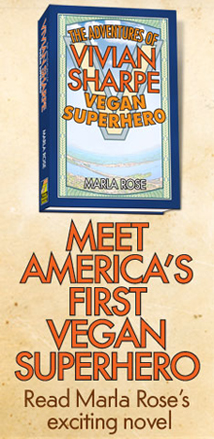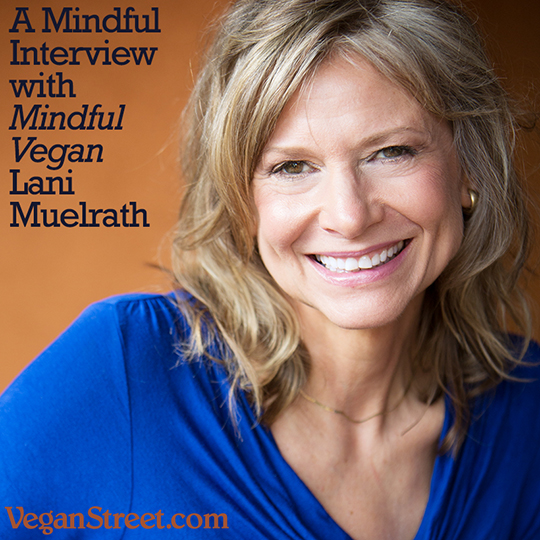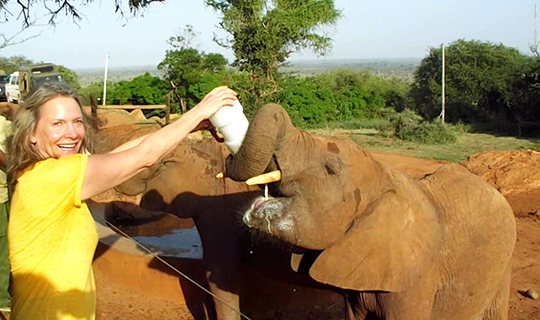

Available in either softbound or Kindle/Nook/etc. eBook at Amazon
viviansharpe.com

  A Mindful Interview with Mindful Vegan Lani Muelrath by Marla Rose I admit it: I did not initially approach writing this in the most mindful way because I was having a hard time finding the time to read the book. I tried to squeeze it in between other projects. Didn’t work. I aimed to do it on the weekend. I resented it. I attempted to shame myself into powering through. Did not reap great results. I was short-tempered with my loved ones. See above. Finally, one night I read one page. Then another and another and another until it was something I wanted to ditch my other work to do. Even as someone who already tries to practice mindfulness, I had put off reading the book because I was too slammed with busyness and life to really immerse myself in it. (Part of why I am so busy is the story I tell myself that I am only worthwhile if I am slammed with projects but that's a story for another day.) This busyness and avoidance was causing anxiety, guilt, resentment and on and on until I finally cracked open The Mindful Vegan: A 30-Day Plan for Finding Health, Balance, Peace, and Happiness by Lani Muelrath and realized that it was precisely because of that feverish, unsustainable pace and mentality I keep up that I needed to read this book. And it’s been very rewarding to do so. Mindfulness is such a buzzword these days. Why? I think that as the world feels more chaotic and people understand more the importance of self-care in big picture of building a better world, it’s becoming more of a priority. Interestingly, I have heard some people voice displeasure with the term “mindfulness” because isn’t part of the problem that our minds are already full-to-bursting with thoughts and endless reams of information? Professor and Daring Greatly author Brené Brown suggests we use the term “courageous presence” instead. Regardless of what term you use, every day the benefits of mindfulness are becoming more evident and one of the primary vehicles to cultivating it, meditation, helps us to become less reactive to our thoughts and more tuned in to how we can shift to and nurture a more balanced, positive and supportive state of mind. This is where The Mindful Vegan comes in. With a 30-day plan to take you through the often challenging early stages of creating a meditation practice – along with free guided meditations for each corresponding daily chapter – you can be on your way from not being able to sit in meditation for a minute to a full 30-minute sitting practice (and more if you desire). By providing the essential building blocks to meditation and growing on that minute-by-minute with each subsequent chapter and meditation sitting, Lani Muelrath sets her readers up for success. It is particularly written for both vegans and those trying to transition, making an excellent case for how veganism aligns with a mindfulness practice, and why vegans might benefit from living in the world with more mindfulness as well. As someone who was among the many that at one time thought they couldn’t meditate to being someone who now meditates daily, I think of the practice like a shower for my brain, or maybe windshield wipers that help to clear off my murky glass. I had many trials and errors on my way to building a consistent practice, though, sometimes giving up for years at a time. I wish I had this book – written with wisdom, compassion, understanding and lucid, helpful guidance – during many of my previous attempts. Her steps and guidance really create an excellent foundation for meditation, something that can feel so elusive and out-of-grasp, and mindful living. As a longtime educator, public speaker and vegan living enthusiast, Lani brings her extensive experience with a mindfulness meditation practice and considerable strengths as a communicator to her latest book. It is written with grace, confidence, patience, passion and humility, keeping readers engaged and rewarded throughout. I cannot recommend this book enough. (In fact, I am honored to have contributed a small section to the book.) Having met the author in person, and being impressed by her positive, friendly and open attitude and warmth, I can say that if a mindfulness practice can help us all bring a higher level of peace and consciousness to our lives, the whole world would benefit. Marla Rose: What do you mean when you say “mindfulness”? Lani Muelrath: My working definition? It’s a good place to start as it clarifies the foundation for conversation: Mindfulness
is a specific form of mental training, and a particular kind of
awareness you bring to your daily activities. Together, these lead to
reductions in reactivity and the cultivation of positive brain states.
To elaborate on “reductions in reactivity” – how much of our day is filled with reacting out of habit to someone, something, some situation – in a way that multiplies misery? This is precisely what mindfulness practices help to alleviate. And as for positive brain states – our mental habit of wandering mind, ruminating over the past or chewing excessively on future “what ifs” literally move us into a part of the brain where also reside sadness, depression, cravings - even addiction. By cultivating mindfulness – the ability to be more present in this moment, and actually doing what we’re doing while we’re doing it – unobscure our endogenous happiness, peace of mind, equanimity, and compassion. They are all there – we’ve just heaped busy lives and busy minds on top of them! I teach mindfulness in The Mindful Vegan via two pathways: formal practice (specific form of mental training) and awareness you bring to the rest of our day outside of formal practice, called informal practice, or active, mindful living. MR: Do vegans necessarily automatically practice mindful living? LM: Um, no. Our automaticity with habits of thinking, reacting, behaving, are cultivated by years of lack of any kind of training at getting some degree of master over our habits of thinking. This plagues us just as it does everyone else. Vegans do possess a consciousness about living that is certainly more mindful of the horrors of animal agriculture and awareness of human entitlement around animals. Vegans are more mindful of the millions of ways this shows up in how humans treat animals as objects for one use or another. This is one aspect of mindful living. MR: Do omnivores necessarily not practice mindful living? LM: For years, I have seen and read – you may have seen them too - books about mindful eating and mindful living. Not a one of them – that I could find, anyway –addressed mindfulness from the perspective about what or who is on our plate, or how it or they got there, or the collateral damage it causes to our health, the planet, and the other sentient beings with whom we share her. This is one of the reasons I wanted to write The Mindful Vegan. Mindful eating does not mean chewing each bite of cowburger 32 times while eating off of nice dinnerware and listening to classical music. More important is the mindfulness surrounding the contents of our plate. You included the broader ‘living’, though, and not just eating. The same thought reaches into every other aspect of our daily lives – mindfulness of what we wear, the products and services we buy. It can be an endless investigation so we do the best we can, keeping in mind that the main thrust of veganism is causing the least harm possible. It is so easy to do this in so many venues, especially with what we eat. We more often than not have a choice. MR: How does mindfulness extend beyond the table for vegans? For example, how can we practice the habits of mindfulness coexisting in the world as vegans? What occasions might arise that call for it? It seems to me that we could be better communicators of the vegan message if we’re less reactive and more mindful. LM: This realm of mindfulness potential for vegans is huge. And this is where we can also refer back to the definition of mindfulness and reactivity from the first question. Those of us who have been aspiring to be conscious eaters as vegans for any length of time know the stress and anxiety surrounding the reality of the food culture - right down to being the only vegan at the table. We can – and often do – anticipate the redundant questions, the resistance, even hostility from those who don’t - or don’t wish to - examine other factors of what they eat other than taste. Perhaps they are even concerned with health, yet without taking into the bigger picture of health, which reaches to that of our environment, and how our health is affected by the dissonance of saying we love animals while eating them. This is where the resistance comes from, not from anything, necessarily, that we may say. Even quietly enjoying our plant-sourced meal, who of us has not felt a degree of tension in the air? First, it is important to understand where this tension may be coming from. That alone, however, is usually not enough to allow us to navigate these situations and conversations with equanimity, let alone skill. With mindfulness practice, as I teach in The Mindful Vegan, you learn how to get some degree of mastery over your habits of thinking which includes anxiety and automated reactivity in these situations. You learn not to suppress or ignore these emotions, or tell yourself you shouldn’t feel them, or try to intellectualize your way out of them, but to navigate them in a new way so that you can actually be more present with others in a fashion that builds harmony and compassion, rather than exaggerating a polarized position. This makes us more effective as advocates or activists. Being wrapped up in reactivity and anger - even rehearsing clever comebacks that are designed to blame and shame – pull us out of actually being present with others, ourselves, and life in each situation as it arises. As you become more able to tap into your natural equanimity and kindness, these become the more prevalent experience in these conversations and situations. In my experience, the way we can be most effective at bringing others to vegan living is to embody, the best we can, those qualities that we champion: kindness, compassion, non-harming, acknowledgement... Have you ever made a change, as an adult, that has been foisted upon you through blame and shame? Probably not. When we bring to the surface our innate happiness and ease, which allows us to live as happier, healthier, resilient, thriving humans, we are more likely to draw others to the joy of the vegan experience. This is not to be confused with passivity. Inner connectivity, ease, and consistency strengthen our ability to make a difference in the movement in different ways depending on our personalities and strengths. The practice of Vipassana meditation, which I teach in The Mindful Vegan, grows your ability to observe yourself so that you can connect with your feelings and emotions, and respond with more skill. This awareness joined with the space around all of it that you create with mindfulness practices makes it increasingly possible to overcome your own fear and anger to respond with firm, non-hateful or belligerent, honest straightforward forceful speech. It is known as rightful speech. Not every time, but increasingly as you become more practiced in the basic practices of mindfulness training and bringing it to active living in the world. This is very important for the movement. A good example of right speech is vegan activist James Aspey. James has the uncanny ability – most of the time – in conversations with non-vegans, to be direct without being belligerently confrontational. You can tell while watching these conversations, many of which are on his YouTube channel, that he is listening to the other person, being completely present with them, and connecting with them as a human being. He is clear with his own opinion, without being caught in reactivity or a pre-set story. This is what impresses us so much about watching these interactions. And I am certain that, along with some natural talent for communication, it is because James practices meditation – the same school of practice as I do and as I teach in The Mindful Vegan. It is one important reason that he was so enthusiastic about endorsing my book and providing a cover quote. As Dr. Melanie Joy penned for the very first page in The Mindful Vegan, “Mindfulness is probably the most important practice we can ever under¬take. The more we are able to be mindful, or present, the more we are able to feel authentically connected with ourselves and ‘others.’ The ability to be present is at the heart of all healthy relationships: with other humans, with nonhuman beings, with the planet, and with ourselves. When we are present, we relate to all aspects of our lives—including our eating habits—with greater awareness, compassion, and health.” MR: What are your first signs – physical or mental – that you are not being mindful? LM: Increased reactivity, excessive rumination, uncontrollable wandering mind – where you can’t stop running in unproductive thinking loops. Automaticity – acting, speaking, and being hijacked by your thoughts on autopilot. This can show up as mindless snacking, cravings, compulsive behavior of any kind, surprising outbursts of anger, heightened stress, escaping through one obsession or another. These are all signs of being pulled out of a mindful presence. Unchecked automaticity, reactivity, and excessive rumination hooks neural activity associated with negative brain states – cravings, sadness, depression, obsession, even cravings and addictions. Being mindfully present brings brain activity directly out of these states. It’s like turning on and off a switch, or changing tracks in the train station. Bringing yourself back to the present actually moves brain activity into another center of the brain where reside happiness, joy, compassion, and equanimity. MR: It seems to me like I hear so many people say that they “can’t meditate” like there is something uniquely wrong with them when, in fact, it is just so much about how our frenetic brains are wired that it feels alien at first and people give up. What do you say to someone who thinks she “can’t meditate”? LM: This is a universal experience. We sit down to fill just two or three minutes with being present with the breath coming in and out of the body, and our minds become instantly rambunctious – like the windup monkey toy with the clapping symbols in his hands. In truth, that’s what our minds are always doing – we just don’t notice it. We are usually just listening to the mind’s every story and following its every whim, as if we had no choice in the matter. And actually, unless we undergo some kind of training for the mind – which most of us never got in school or otherwise – we don’t. We don’t even know that there might be the possibility of a choice. It is very helpful to hear that meditation practice is not about trying to stop thoughts or to not think during meditation practice. Thinking is what the mind does. What we are doing with mindfulness practice is discovering that we don’t have to believe everything we think, or go with every story the mind conjures up. Viktor Frankl said “Between stimulus and response there is a space. In that space is the power to choose our response. In our response lies our growth and our freedom”. Mindfulness practices are about expanding that space, so we can grow our ability to choose and live more skillfully, rather than out of reactivity. With mindfulness training, you do little things with your mind that make big changes in your brain and experience of living. MR: Does meditation get easier over time? Conversely, do you still have days that are challenging for you with your meditation practice? LM: Yes, and yes. Easier is probably not the best word. But as you develop the ability, through simple mental training, to not let yourself be hijacked by every thought, and to bring yourself back to the present – whether in formal practice or living with all the ups and downs of life –it becomes a skill you are better at, just like any skill you might practice. Sometimes my sitting practice is spacious, still, transcendent, the mind seems to settle a little more, or I am better at not engaging it its constant chatter, and the experience is very pleasant. Other times I can be off and wandering in thought for five minutes before I realize it and must once again bring myself back to practice. The important thing, I remind myself, is that it is the practice of bringing the attention back to anchor point from its habit of wandering that is key. Having a quiet mind, no thoughts occurring, being perfectly happy every minute to sit still – these are going to come and go, just like everything else. The point is to learn to hold steady and navigate these ups and downs – a skill directly applicable to the next meal, the next challenging encounter – the next life experience. MR: How does mindfulness benefit someone who wants to transition to veganism easier? HL: Through mindfulness practices you become more acquainted with yourself in ways that may have previously been unimagined. You become more acutely aware of inconsistencies in your life, dissonance between what you value and what your actions may demonstrate. You become more attuned to the impact of your choices - and that includes what you eat. I have a direct personal experience of this that I wrote about in The Mindful Vegan. It was my mindfulness practice that eventually pushed me to get dairy products off my plate, the last holdout from my previous vegetarian diet. I became increasingly uncomfortable with something as simple as driving on roads that passed through fields of cows, knowing I was contributing to their miserable fate. Mindfulness practices sharpen your interoception, or perception of how things feel in your body – with everything from emotions to hunger and fullness. Increasingly I became aware of the feeling of dissonance in my body when the cows in my presence brought up the inner conflict. Even though I had increasing cognitive knowledge about the problems with dairy, the actual feeling of that inner dissonance is what inspired the tipping point. Eating in closer alignment with your ethics and natural compassion brings a profound sense of well-being. This is the joy of being vegan, which so many of us wish to convey to others. MR: Why do you think that so few people in the personal growth world adopt a vegan lifestyle? HL: Food is one of the strongest foundations and connections of our experience – with family, and culturally and socially. For eons we’ve gathered around the fire to enjoy familiar foods, nourish ourselves and each other. Giving and receiving food are two of the kindest and most pleasurable acts we can engage in. When we make a noticeable shift in that tradition by changing what we eat and questioning what has always been on the table because we have seen the circumstances behind it, it brings up all the issues of breaking with the familial and societal status quo. This may then become relationship challenging territory into which people interested in personal growth may not want to venture. There’s also something known as the Meat Paradox – central to the studies on Day 19 of The Mindful Vegan. The Meat Paradox, briefly, is when people awakened to the contradiction of eating animals while loving them actually become more militant in opposition to giving up animal products. It causes the discomfort of conflict within them. We, as vegans, uncover this discomfort, even if we haven’t said or done anything to directly cause opposition. We become the messenger they want to shoot. Understanding this, as ironic as it may be, is very helpful in developing compassion for and being present in these circumstances.  MR: I think it’s amazing that as part of the book, readers get access to your 30-days of guided meditations. It’s such a value added. What do you think makes your program different? HL: Thank you! I tried to think of as many ways as I could to encourage people to try these tools out for themselves. Setting it up as a 30-day plan is one of those ways – instead of having a book with some great ideas that you could get to later, I wanted to make the practice easily accessible, with full instruction, from Day One. The audios I made as companion - now downloadable immediately on my website (the instructions for how to navigate to them are in The Mindful Vegan in Resources) is another. And I wanted to make them free, to make it even easier. I have partnered with Insight Timer App (to bring several tracks to the public at large, so people could try them and also so that people could find out that there is a project available that brings these two together – mindfulness and veganism – via The Mindful Vegan. Though she is a book, I actually see this as a project. I have been teaching and leading group meditations all over the place at no charge, to further the reach of this valuable message. My intention is to bring more ease of living and restore the pure joy of eating, and to assist and support the challenges of being vegan in an omnivorous world, so that we can be better advocates for change and more effective at touching the world. This starts with an inner connection and also reaches into the deep need to address compassion fatigue. I am deeply honored that Dr. Melanie Joy refers to The Mindful Vegan in her new book about living vegan, Beyond Beliefs, and that she recommends The Mindful Vegan in her Center for Effective Vegan Advocacy trainings. This is a long answer to your question, yet together they all underscore the uniqueness of this book. These qualities, along with the fact that this guide is written by a teacher – I have taught for over four decades at both the college and middle school level – which means I am practiced in figuring out how to take what might be a complex challenge and break it down into step-by-step doable bits. In this way, skills build one upon another. This is in contrast to meditation guides that present a random set of techniques, all of which may be excellent, but I have found can leave you a bit lost as you try to figure out how to best proceed. I’m also an academic, which means I value the science behind what I teach and practice, and The Mindful Vegan is packed with references to the research on the benefits of mindfulness training, of which there are now thousands of research studies. These practices have been shown to have positive benefit on everything from stress and anxiety management to smoking cessation to binge eating – and it’s all there in the book. MR: Thank you, Lani! I am so grateful for this book. © 2015, Vegan Street |













 |
 |
 |
 |
 |
 |
 |
